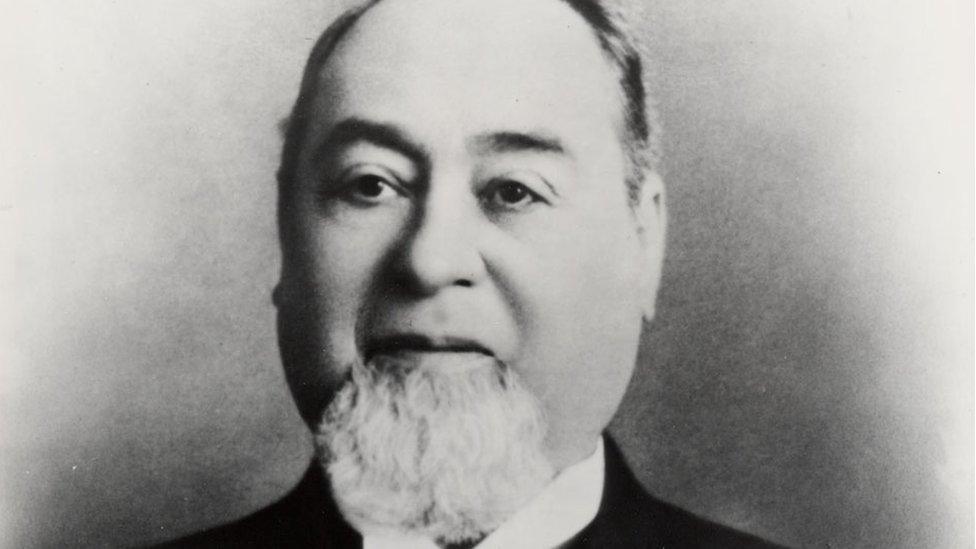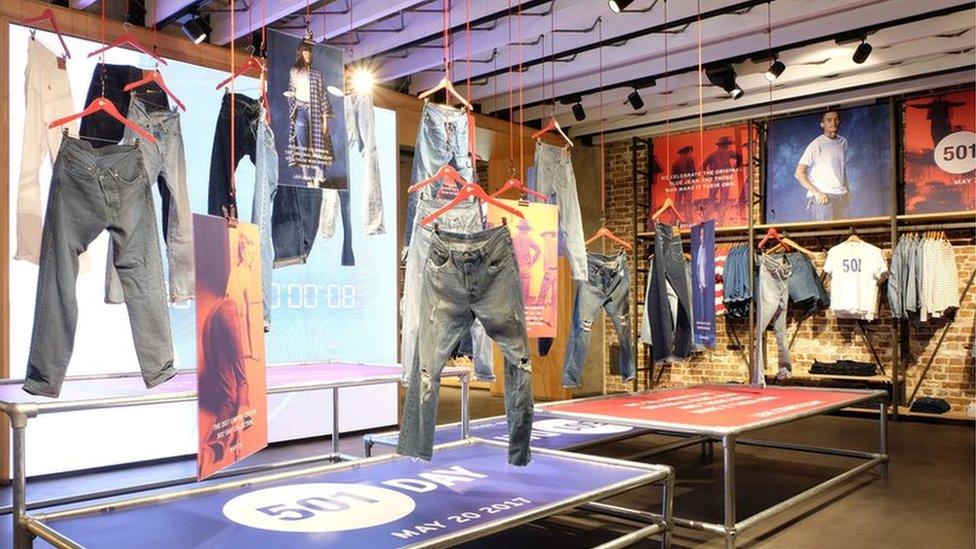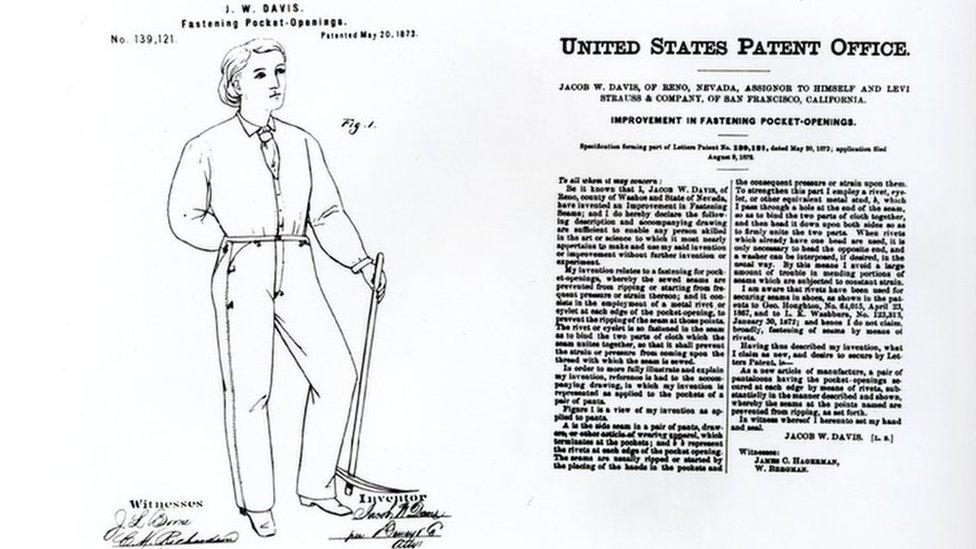How jeans giant Levi Strauss got its mojo back
- Published

Chip Bergh has the air of man at ease with the world. But things could have turned out very different, given what he calls his "dysfunctional" childhood.
The 60-year-old chief executive of Levi Strauss, dressed in regulation blue jeans and denim shirt, readily admits to be being "blessed and lucky".
Six years into his successful turnaround of the once struggling US clothing firm, he says the job still gives him a "wow" feeling.
Mr Bergh and his family also love their San Francisco lifestyle, where the vegan boss pursues a passion for marathons and triathlons.
So, professionally and personally, things are going well for the former Procter & Gamble (P&G) executive.
But growing up in the suburbs of New York City there were times when he felt neither blessed nor lucky.
Mr Bergh's father was an advertising salesman working 14-hour days. He was also an alcoholic.

There could be "lots of screaming and yelling" at home, Mr Bergh recalls. "Mum and dad were always getting in fights."
One day his mother threatened to throw out his dad. "That was a wake up call," says Mr Bergh.
His father then finally went to Alcoholics Anonymous, cleaned himself up and never touched another drop.
"I'm proud that my dad recovered," says Mr Bergh. "He rebuilt his life."
Mr Bergh's childhood wasn't unhappy. "I had a lot of friends, played a lot of sport, and went to a great school," he says. But as the eldest of three children he says he shouldered much of the domestic discord, and grew up fast.
It left its mark and is in part behind his drive to succeed, he thinks. It also left a determination not to repeat some of his father's mistakes.
"I'm pretty level-headed," says Mr Bergh. "There's not a lot that really upsets me. I'm not a yeller and screamer, at home or work. I'm pretty relaxed." And he doesn't drink.

Levi Strauss emigrated to the US from Germany in 1853 when he was 18
So, how does Mr Bergh sum up his management style? "Very open, honest, transparent. What you see is what you get."
He insists he's "really down to earth", adding: "I put my pants on the same way everybody else does - one leg at a time."
Just don't confuse this regular-guy image with a lack of steel, as Mr Bergh's overhaul of Levi's has been radical, some might say brutal.
The company was created in 1873 when San Francisco-based wholesale merchant Levi Strauss and a business partner patented a way to strengthen denim trousers using copper rivets. The rest as they say is history.
Through slick advertising and campaigning on social and political issues (such as donating millions to HIV/Aids charities), Levi's punched above its weight for decades.
Stories were common in the 1960s and 1970s of young Westerners packing Levi's jeans in their luggage to help barter their way through holidays behind the Iron Curtain.
If ever a brand deserved the label "iconic", Levi's was it.

The Levi 501 jeans are arguably the company's single most important product
But by the time Mr Bergh took over in 2011, the company he calls the original Silicon Valley start-up "had lost its way".
Annual sales peaked in 1997 at $7.1bn (£5.3bn). "We were bigger than Nike then," says Mr Bergh. "Nike aspired to be like Levi's."
But Levi's lost its knack of combining heritage with changing trends, and by the early 2000s sales had fallen to $4bn.
Competition from the likes of Walmart and Gap had increased rapidly. Levi had also borrowed heavily, chiefly to buy out scores of Strauss family descendants, and consolidate ownership.
The result, says Mr Bergh, was that the firm found it had to "cut costs, cut marketing, to save cash".
Levi's board ultimately decided it needed a fresh pair of hands, and so turned to Mr Bergh, who had the brand expertise and international experience it wanted.
After 28 years at P&G, most latterly working on the Old Spice deodorant and razors accounts, Mr Bergh saw a chance to fulfil an ambition to become a chief executive.
"It was too good an opportunity to pass," he says. "It was an opportunity to make a difference, and leave a legacy."

Chip Bergh is not afraid to "double denim"
All too aware that Levi's was struggling, Mr Bergh sent the firm's then top 60 managers six questions about the pros and cons of the business - and started interviewing each of them.
"But by about the 15th interview it was pretty clear what needed to be done," he says. "There was no strategy, there was no alignment across the organisation... People were frustrated."

More The Boss features, which every week profile a different business leader from around the world:

Mr Bergh invested in facilities, broadened the clothing range (especially womenswear), and expanded in relatively untapped markets such as Russia, China and India.
The ecommerce operation, previously outsourced and treated almost as an after-thought, was brought in-house, modernised and expanded.
Mr Bergh also changed the top team at the business. Within 18 months of his appointment, nine of the 11-member executive team had left. Of the current 150 senior managers, two-thirds have been with the company for three years or less.
He says: "We needed to change not just the business but the culture, and the best way to change the culture is to change the leadership."

The original US patent for riveted jeans, from 1873
Mr Bergh admits the clear out was dramatic, sometimes traumatic, but says: "You always have to do the harder right than the easier wrong."
Did he learn such decisiveness in the army, which he joined for two years after school? Making quick decisions was certainly part of the skill-set, he says. But the army also taught him about leadership.
"It's wrong that the army is all about deference and saluting seniors," he says. "You have to earn respect, build trust, be willing to make decisions, coach people and train people - all those skills are transferable to the corporate world."
The army's downside was that promotion moved slowly, and Mr Bergh wanted to "move ahead quickly". A recruitment firm found him a job at P&G.
Chip Bergh on letting staff go with dignity
Levi's turnaround seems to be succeeding, with 2017 expected to see the fifth consecutive year of profits growth.
Retail analyst Marshal Cohen, of market research group NPD, says that yet again Levi's has been able to "reinvent" itself to a new generation.
However, Mr Bergh says the job is far from finished. "We have made really good progress. It's been harder and taken longer than I expected.
"I'm not satisfied with where we are. We still have a lot more work to do."